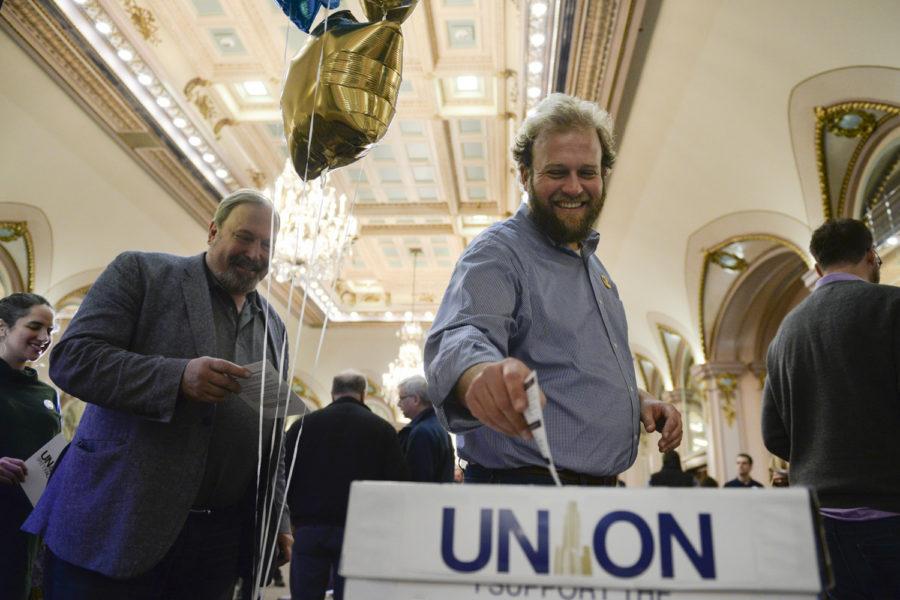Series | Pitt included retirees, administrators in faculty union bargaining unit
Faculty union organizers called the move “disgusting and obvious union busting.” Pitt chalked it up to poor communication.
Tyler Bickford, a professor in the English department, drops one of the first union cards at a kick-off event held by Pitt faculty union organizers in the William Pitt Union Ballroom in January 2018.
This article is the introduction to an in-depth series about Pitt’s faculty union campaign.
When Pitt faculty filed for a union election in January after years of knocking on office doors, handing out fliers and persuading thousands of faculty to join the cause, organizers thanked University administration for staying impartial on their campaign.
“The administration has been really hands off, which is great,” Tyler McAndrew, a faculty union organizer and visiting lecturer in the English department, said that month.
But that trust and gratitude had evaporated by July, when union organizers accused the University of breaking the law to derail unionization efforts.
After collecting signed authorization cards from more than 30% of Pitt faculty, The Pitt Faculty Organizing Committee petitioned for a union election Jan. 18. In response, the University provided a list of 4,018 faculty that it deemed eligible for the union’s bargaining unit to the Pennsylvania Labor Relations Board.
But that list, submitted March 23, contained hundreds of administrators, graduate students and retired faculty. These groups of people are rarely allowed in a faculty union, according to Pennsylvania labor laws and precedents set by other universities.
At a two-day hearing in late July, where union organizers and Pitt’s attorneys jousted over what organizers called the “unjustified” inclusions on the list, PLRB Hearing Examiner Stephen Helmerich ruled in favor of organizers, declaring more than 700 inclusions to be questionable and ordering Pitt to turn employment records over to organizers for further analysis.
That wasn’t the first — or last — time Pitt came under scrutiny for what Helmerich called “unfair labor practices.” Helmerich found Pitt guilty of “coercive acts” that possibly influenced the April graduate student union election and subsequently ordered a new election. Last week, Pitt filed an exception attempting to block a second election.
The University has also shelled out nearly a quarter-million dollars to “union avoidance” law firm Ballard Spahr since 2016, according to financial disclosure reports published by The Pitt News in May.
As Pitt fields intensifying criticism from organizers for its actions in both unionization efforts, University representatives have remained publicly neutral toward the faculty union campaign.
Pitt spokesperson Kevin Zwick said the University has never tried to stall a faculty union election, and claimed that many inclusions on the list that organizers have challenged are actually justified. The questionable inclusions, he said, were the result of unclear communication from organizers.
But union organizers from Pitt and United Steelworkers, the union aiding the faculty’s unionization campaign, claim the University intentionally packed the bargaining unit to stall a union election. McAndrew called the move “disgusting and obvious union busting.”
Through analysis of documents exchanged between faculty union organizers and the University administration, and in-depth interviews with both parties, The Pitt News conducted a two-month-long investigation into who was included on the list, whether or not they belong in the bargaining unit and why Pitt and union organizers continue to quarrel.
Read the rest of this series:
Neena is a senior staff writer at The Pitt News who has covered Pitt's graduate student and faculty union campaigns since January 2019. Originally from...


